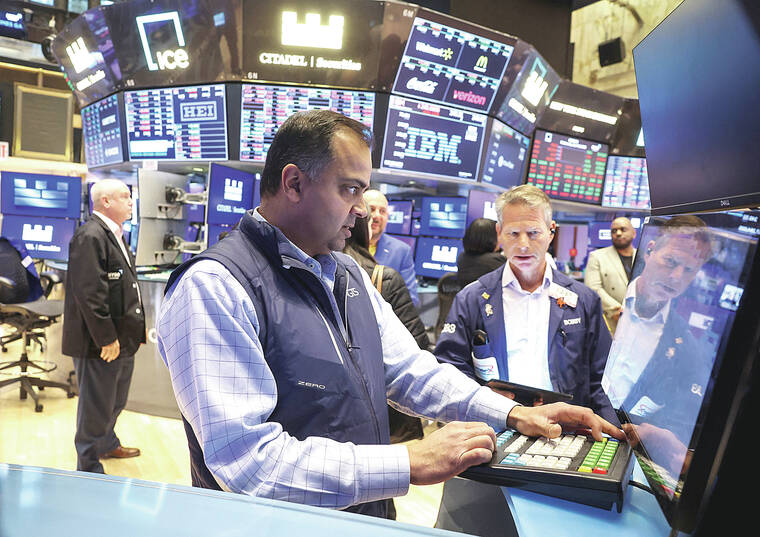Stocks fall as Powell sees tariff challenges and tech pulls back
Stocks slumped Wednesday as investors faced new evidence of how the global trade war will hurt some of the world’s biggest technology companies, and heard from the Federal Reserve about the challenge it faces if prices rise while growth slows.
The S&P 500 slumped 2.2%, ending the relative calm that had come over the markets to start the week. Those losses steepened in the afternoon after Jerome Powell, the chair of the Federal Reserve, said tariffs and their potential inflationary effects could put the central bank in a “challenging scenario.”
ADVERTISING
Powell laid out the dilemma the Fed might confront if its two goals — a healthy labor market on the one hand, and low and stable inflation on the other — are in tension. That would force the central bank to prioritize one over the other, leading to what Powell said would “no doubt be a very difficult judgment.” The Fed chair made clear Wednesday that he was concerned about the potential for President Donald Trump’s tariffs to stoke a persistent inflation problem, something he said the Fed was obligated to ensure did not happen.
But markets had already begun the day on a sour note, after Nvidia, the American chip giant, said that the U.S. government would restrict sales of some of its chips to China, signifying the first major limits that the Trump administration has put on semiconductor sales abroad. Nvidia dominates the market for chips used in building artificial intelligence systems and will now require a license to sell AI chips to China.
In a regulatory filing Tuesday, Nvidia said it would take a $5.5 billion hit because of piles of chips it would not be able to sell and orders it would not be able to fill. Shares of Nvidia, which exert great influence over market indexes because of the company’s size, fell nearly 7%.
Advanced Micro Devices, another chip maker, said in a filing Wednesday that the export controls would result in charges of $800 million to its “inventory, purchase commitments and related reserves.” The company’s stock also sank more than 7%.
And in Europe, shares of ASML, the Dutch company whose machines are essential for manufacturing the most advanced semiconductors, fell more than 4% Wednesday after it said that orders for its equipment had fallen short of expectations. Christophe Fouquet, the company’s CEO, said the Trump administration’s tariffs had “increased uncertainty.”
The tech-heavy Nasdaq composite index dropped more than 3%. The Stoxx Europe 600 index fell about 0.2%, with most markets in the region trading lower.
Stock market benchmarks in Japan fell 1% Wednesday. Share prices were down 2% in Hong Kong and 2% in Taiwan, a hub of global chip manufacturing. The maker of most of the world’s advanced chips, Taiwan Semiconductor Manufacturing Co., dropped 2.5%. Its South Korean chipmaking rivals, Samsung and SK Hynix, each fell over 3%.
Trump’s whipsawing tariff policies are still driving sentiment in global markets, especially in sectors facing the threat of more levies or potential reprieves. Last week, markets around the world veered sharply between large gains and losses.
A recent survey by Bank of America showed that global investors have cut their U.S. stock holdings by a record amount in the past two months and that the potential for a recession spurred by Trump’s trade war poses a major risk to markets. Market volatility and investors’ growing aversion to risk pose “the most imminent risks to credit in the current environment,” S&P Global wrote in a research note Wednesday, adding that global default rates could increase if tariffs remain elevated.
Gold, a traditional safe haven during times of turmoil, rose to another record high Wednesday, pushing above $3,300 per ounce for the first time. The price of the precious metal has jumped more than 25% this year.
© 2025 The New York Times Company





